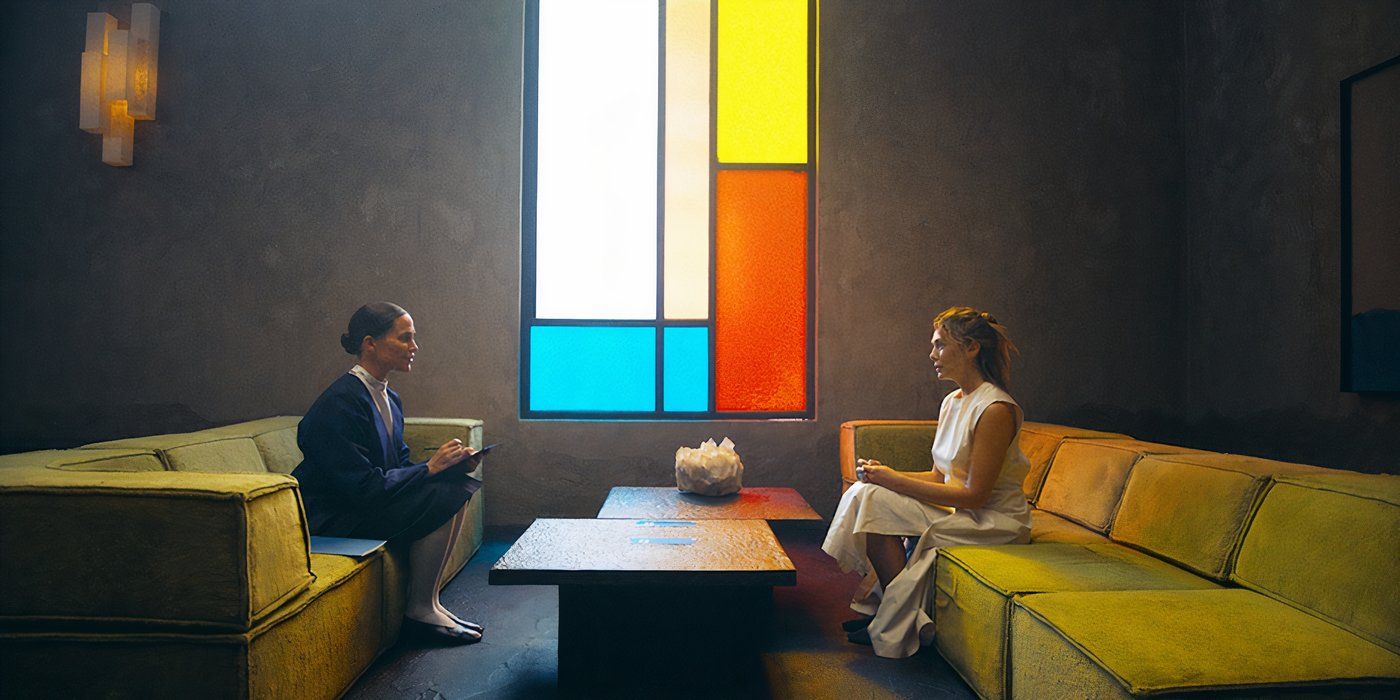In the near future, if a couple wants to have children, they can only do so after being given the green light following a successful seven-day assessment. In the world created by writers John Donelly and Mrs. and Mr. Thomas (Nell Garfath Fox and Dave Thomas), there’s control of just about everything. This future society is also where people take pills to remain youthful and alive for far longer than typically possible. The Assessment,
directed by Fleur Fortuné, is conceptually sound and looks incredible, but while it’s psychologically involved and provoking, it doesn’t go beyond the surface of its ideas.
Mia (Elizabeth Olsen) and Aaryan (Himesh Patel), an architect of the controlled world they live in, are desperate for a child. After passing initial examinations, Virginia (Alicia Vikander) is assigned to assess the couple in their home for a week. Virginia asks them invasive questions, watches Mia and Aaryan have sex, and pretends to be a child to learn more about what kind of parents they’d be. As the assessment approaches its end, the more Virginia works to psychologically torture the couple. The assessment and right to have a child brings its fair share of questions and tension.
The Assessment’s Worldbuilding & Cinematography Are Standouts
When it comes to building a near-future world and having us believe it exists, The Assessment does a fabulous job. Mia and Aaryan live in isolation, but what is in and around their home paints a picture of what this future looks like. It’s realistic enough to the world we live in today, but there’s a stiff, clinical feeling that permeates the characters’ surroundings that gives away the difference. This is a world that hasn’t erased the past, however, with the old world still existing right outside its borders.
Fortuné has a firm grasp of what this world is meant to represent and the feelings it evokes in us for the nearly two hours we’re immersed in it.
Mia’s mother left to return to the old world, and it’s a point of contention between her and Virginia, who seems awfully judgmental of that fact. When the couple’s friends come for dinner, in a stellar and riotously funny scene that includes an excellent Minnie Driver, the world expands with new information, and nothing is forced in that regard. Fortuné has a firm grasp of what this world is meant to represent and the feelings it evokes in us for the nearly two hours we’re immersed in it. I was in awe but trapped at the same time.
Magnus Nordenhof Jønck’s cinematography sharpens the colors of the costumes and set while making them dim enough to feel distant and cold. The coloring of the inside is a contrast to the vivid light of the sun and the clear blue of the ocean that sits just outside the house.
The Assessment Is Conceptually Sound But Fails To Deeply Explore Its Themes
The cast does great work regardless
Mia struggles the most with the assessment because, despite wanting a child, she also craves the realness the process robs her of. This becomes even more clear as she’s faced with the confines of her situation — in the assessment and in her marriage. The Assessment explores themes of reality versus a controlled environment and what the characters are willing to do to remain in it out of fear of facing uncertainty in the old world. It’s fascinating to watch how this affects the characters’ dynamics, but the film doesn’t venture far enough to be wholly satisfying.
The Assessment is thoughtful and compelling, but it just doesn’t reach the heights needed to keep its momentum.
The assessment itself goes on for too long. By the time certain revelations come to light, there isn’t enough time to sit with them before the film ends. Characters make decisions that make sense for where their story goes, but there’s a lack of depth that leads to some narrative disengagement. When much of the film is about the chaos of Virginia’s actions, the assessment’s fallout doesn’t get any time to develop, and the ramifications for the characters thereafter feel underwhelming. The Assessment is thoughtful and compelling, but it just doesn’t reach the heights needed to keep its momentum.
This lack of exploration doesn’t affect the performances. Olsen has been making some great role choices, and here is no different. Mia is haunted by her mother’s departure to the old world and doesn’t seem fully settled into her life, something the assessment brings to the surface. Olsen portrays Mia with a frustrated impatience with a side of unexpected tenderness. Patel’s Aaryan is aloof, often disappearing into his simulation lab to create things that are almost real but not. He goes through a lot too, but he’s more patient and content to live in a world of his own creation.
Vikander is the highlight of the film. She’s completely unhinged as Virginia, oscillating between uncomfortable behaviors and wild tantrums to straight-laced corporate decorum in the span of minutes. It’s just too bad The Assessment fails to explore her character any further considering the ending. The film may have its faults, but it’s still a thoughtful rumination on the willingness to ignore reality and what people are ready to give up — including their dignity — to get what they want despite losing their freedoms. Fortuné has a good grasp of the world, even if she doesn’t push more than needed.
The Assessment premiered at the 2024 Toronto International Film Festival. The film is 109 minutes long and not yet rated.

